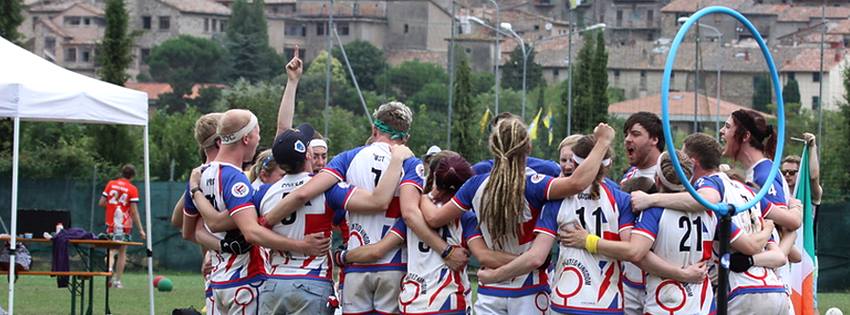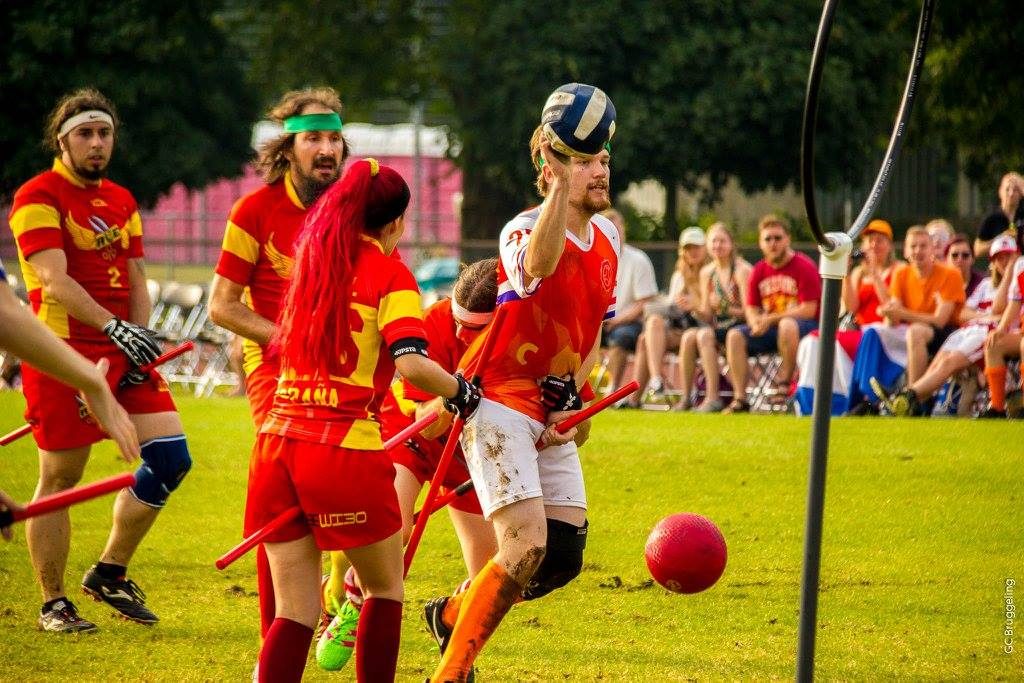- Rule, Britannia, no more?
- Unpopular Opinions: US Quadball Cup 2023
- Proven Contenders: University of Virginia
- Proven Contenders: Rutgers University
- Proven Contenders: University of Michigan
- Proven Contenders: Creighton University
- Different Perspectives: A Look Inside USA Ultimate
- Antwerp QC, Much of Belgian Core, Leaves Competitive Quidditch
Four Reasons for a North American to Watch European Games
- By Ethan Sturm
- Updated: July 7, 2017

Credit: Howard Orridge
Quidditch enters a quiet period in the United States over the next two weekends, with just four MLQ matches on the docket in that time. But things are heating up across the pond, where the European Games are set to kick off in Oslo, Norway on Saturday morning.
With well over 100 USQ, 21 Quidditch Canada and 16 MLQ teams right here in North America, it can be tough to keep up with leagues an ocean away. The time zones make it even harder. But if World Cup 2016 was the last time you’ve tuned into European quidditch, a lot has changed.
A total of 15 national teams will compete at the two-day European Games and there are an abundance of reasons to tune in, even if you cannot tell the difference between Norway and Sweden. And with a high-quality livestream promised, there is no excuse not to watch. Below, we’ve highlighted the four best reasons to take some time out of the early hours of your Saturday and Sunday to check out the European Games.
- Parity is Alive and Well
Since the earliest days of European quidditch, it was the world of the Brits and the Franks–and everyone else was just living in it. At the 2012 Summer Games, a precursor to Global Games and the IQA World Cup, the United Kingdom and France were the only European countries to send teams. At the 2014 Global Games, they were the top two finishing European teams, though admittedly only three attended. At the 2015 European Games, they faced off in the gold medal match, playing a combined two snitch range games on their way there. At World Cup 2016, the United Kingdom was the only European team to make the semifinals–walking away with the bronze medal–while France was one of three European squads ousted in the quarterfinals, although they did keep eventual gold medalists Australia in snitch range.
On the club level, the two countries have been just as dominant. At the first four European Quidditch Cups, seven of the eight finalists were either British or French, with three French and one British champion. In 2015, perhaps the height of Anglo-French power, all four clubs that made the semifinals came from one of the two nations.
But since that day in Oxford when the Union Jack and Tricolour were all that could be found in the late rounds, the rest of the continent has rapidly caught up. At the 2016 European Quidditch Cup, Deurne Doda A of Belgium, now Antwerp Quidditch Club, made a run up the weak side of the bracket all the way to finals, where they kept the defending champion Paris Titans in range before falling, 120*-60.
A year later, at the same tournament, both Parisian teams were bounced in the quarterfinals, with NTNUI Rumpeldunk of Norway upsetting the Titans, 100*-80 and Antwerp getting their revenge on the French by dominating the Paris Frogs, 120*-60. Antwerp then knocked out the last remaining British team, Werewolves of London, out-of-range in the semifinals. Meanwhile, METU Unicorns from Turkey powered their way through the other side of the bracket, getting out-of-range in every match and taking down a British team of their own in Warwick Quidditch Club. For the first time in European quidditch history, there would be a major continental tournament final without a French or British team.
Just months after that shocking European Quidditch Cup, the United Kingdom and France will be placed in a pool with the three nations that finally seem to have leveled the playing field: Belgium, Norway and Turkey. Each will be bringing a strong squad, with access to pretty much all of the clubs that made those historic runs. But whether the stars of a handful of clubs can compete with the United Kingdom–a national team of a country with upwards of 40 teams–or France–the defending European Games champions–remains to be seen. But whether they are all the way there or not, expect a lot of highly-contested matches at the top of the tournament.

Credit: Bruggeling Quidditch Photography
- Formatting Change
The reason that the incredible pool mentioned above can exist is the implementation of a new and innovative format on the international quidditch stage. European Games has chosen to do away with the standard balanced pools into bracket play that feels ubiquitous in quidditch at times and that we at The Eighth Man have come out strongly against in the past.
In the above linked article, I advocated for a stacked pool format, wherein the best teams get put in one pool, the next group in a pool and so on. This would greatly increase the amount of competitive games played at the tournament, with pool play filled with matchups of balanced teams instead of teams of massively different skill levels.
This stacked pool format is what we will see this year at European Games. The top five teams will be in Pool One, the next five in Pool Two and the final five in Pool Three. On day one, each pool will basically battle for bracket seeding, with Pool One sorting out seeds No. 1 to No. 5, Pool Two deciding seeds No. 6 to No. 10 and Pool Three determining seeds No. 11 to No. 15.
This is exciting not only at the top of the tournament–where we will have the chance for all five of the best teams to play each other on Saturday–but also further down, where we will get to see the tiers form amongst the middling European teams, who will all be playing each other instead of all getting eliminated in the same round of bracket play by better teams with no intra-play beforehand.
While the stakes of these pools are arguably low, since every team advances to bracket play regardless of the results, there is still a lot on the line in these fights for seeding. The No. 1 seed gets a bye in the first round on Sunday and avoids the No. 2 and No. 3 seeds until the finals. No. 2 and No. 3 do not have to face another Pool One team until the semifinals, while No. 4 and No. 5 will have to match up in the quarterfinals.
Even if the teams use these games simply to get their feet under them and work out the kinks that are often associated with national teams, this format will still make for an infinitely more watchable Saturday. The very first game livestreamed on Saturday is United Kingdom vs. Norway, and before the day is through we will also be able to see United Kingdom vs. France, Turkey vs. Norway and United Kingdom vs. Belgium. And that’s all just on the live stream.
Maybe the format will not be the success we predicted but its effects, as well as the compelling games it creates, are worth keeping an eye on.
- Last Stop ‘Til World Cup
It may seem hard to believe, especially with our national team development still in its infancy this cycle, but World Cup 2018–both the quidditch one and the soccer one–is almost exactly one year away. And with no Pan-American or Asian games in the works, this will likely be our final chance to see national teams in action before the United States begins its quest to take back the gold medal. It is also a tournament that includes upwards of two-thirds of all national teams expected to compete at Cup next year.
While a year may seem like a lifetime in a sport that has only existed for twelve, it is actually not that much time at all. With many nations implementing standing national teams –rosters that remain and practice together throughout the year, rather than ones that are built just for major tournaments–there is a lot of reason to believe that many of these teams will look the same now as they do in 2018. Even if a player has a slight drop off in form, it will likely make more sense to carry someone on a roster that is used to playing with the rest of the squad, and implementation of new talent on the national level might begin to happen at a slower pace.

Credit: David Richardson
European Games also offer a chance to catch up with those top athletes that impressed at World Cup before once again disappearing from the American collective vision. Louis Lermytte was an athletic dynamo at all positions for Belgium in 2016 and has won a European Quidditch Cup with Antwerp QC since. Lucy Q of the United Kingdom has continued to play beater at a higher level than just about anyone in the world and is a massive piece in creating an unleveled playing field on the pitch. None of these are new names, and are old hats for those more familiar with the European scene, but European Games offer a welcome reminder for those of us that are not.
Finally, it’s an important opportunity to see where strategy stands on the international quidditch scene. With national teams often thrown together in the past, strategy has been at a premium at past World Cups and European Games and generally amounted to loose, sloppy versions of the main strategies at the time. But now, many of these teams have practices under their belts, which–mixed with the differing styles of national leagues–could create a varied, interesting metagame of strategies. Will we see more offensive beating or more one-and-a-half plays? Will slowballing peak as it had stateside before the new rule implementations or will the pace stay fast? And how will teams use the added lineup variance created by the IQA Rulebook with snitch-on-pitch, when three non-majority gender players are required?
European Games offer an important opportunity for these national teams to prepare for World Cup. For the rest of the world, that chance may not exist but a massive amount can be gained simply by seeing how this tournament progresses.
- Sporting Events With National Identities are Just Fun
There is a reason that the Olympics are the most popular sporting event in the world and that the FIFA World Cup is the only time in four years most of America cares about soccer: Stick a national flag on a sports team and you connect an entire country to it.
These nationalistic sports feelings often get even stronger in times of political strife, and whether you are in North America, Europe or Asia, the storylines in contests between countries are larger than ever.
When Team USA lost a year ago, it was an entire country’s quidditch community up in arms. How will the British and French communities react if their reign at the top of Europe is finally upended? And how will Norway, a country long on the edge of competing at the top of the continent, play in front of a home crowd after years of traveling further than almost anyone for European competitions.
Highly recognizable national identities come with storylines all but built in, and this tournament has no shortage. Whether you are tuning it at 3 am ET for the opening series between the United Kingdom and Norway or just tuning it Sunday morning at a more reasonable hour for the semifinals and finals, it should be easy enough to leap right into the stakes of any given match.
Related Posts
About Ethan Sturm
Ethan is the co-founder and former managerial editor and chief correspondent of The Eighth Man. When not talking quidditch, which is rare, he can be found drilling people's teeth and spending time with his elusive wife. He's also the worst.



